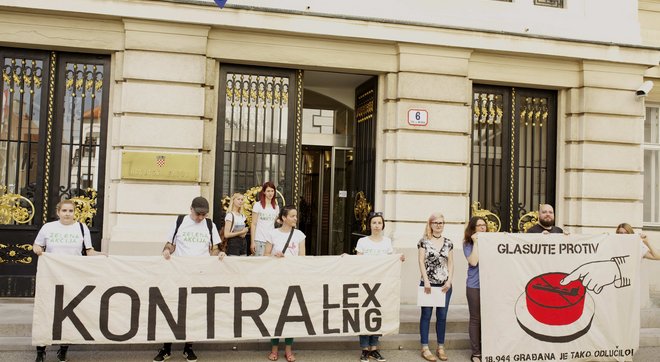Briefing 'Looting 2.0: supporting state capture at the Krk gas terminal'
The new report "Looting 2.0: supporting state capture at the Krk gas terminal", prepared by Counter Balance and Re:Common, and supported by Zelena akcija/FoE Croatia and Friends of the Earth Europe, reveals alleged hidden interests behind the Krk LNG project, i.e. how private interests have had a significant impact on the decision-making process in the project.
Over the last decade, the building of a Liquefied Natural Gas (LNG) and regasification plant on the property of the Dioki petrochemical complex in Omisalj, Croatia, has been under consideration. This project is better known as the “Krk LNG Terminal”. The terminal is an industrial energy project aimed to gasify gas arriving on the island of Krk via ships and re-export it towards Hungary and other European countries.
This flagship project of the Croatian government also enjoys the strong support of the European Union and features among the so-called EU “projects of common interest”.
This despite the tortuous legacy of the project, tracing back to allegedly corrupt relationships that have been tainting the economy and politics of Croatia for decades and are now exposed via the trial of former Prime Minister Ivo Sanader.
Indeed, as a legacy of the turbulent 1990s, hundreds of politically exposed persons part of the bureaucratic structure of former Yugoslavia repositioned themselves in the new state structure or supported new private entrepreneurs that could benefit from the sell-out of publicly controlled companies, including in strategic sectors such as energy.
Such murky system inevitably influences the decision-making process in Croatia still today. In a project like the Krk LNG terminal, even the deals over the very construction site of the project are allegedly part of corrupt deals dating back to the Sanader era. And the line between the interests of “politically exposed persons” and the actual energy needs of the country and its citizens is pretty blurred.
Firstly, this report aims at exposing the complex net of corrupt relationships that sees the Hungarian energy company MOL, together with the entrepreneur Robert Ježić and former President Ivo Sanader, allegedly involved in a bribe that is currently being investigated by the Croatian anti-corruption authority. A context that should have deterred the EU from offering its unconditional support to the closely-connected Krk LNG project. And the European Investment Bank (EIB) from discussing a EUR 339 million loan to the project.
Then, the report gets back to the bigger picture of the World Bank and IMF-led structural reforms undergone by the Croatian economy to recover enormous post-conflict public debts and raises fundamental questions about today’s responsibility of international institutions – like the European Union. Is public debt being used again to encourage a “service role” of the country by the European Union’s energy policy? And who is eventually benefiting from such mechanism?
The full report can be found HERE.
